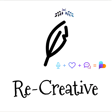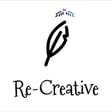
Karina Bates on Pottery and the Eye of Horus
Joe and Mark are joined by Karina Bates, a potter from Omemee, Ontario.
Karina takes the lads through a quick tour of what it’s like the throw pots and other ceramics on the wheel. Her work tends to be functional and purposeful.
“It’s a nice feeling to have people hold up a cup you’ve made and say they enjoy having their coffee in it,” says Karina.
On the bottom of every piece, Karina leaves her "maker's mark", which is the Eye of Horus. In ancient Egypt, Horus was represented as a falcon-headed man, and was the god of order. His right eye was the morning star, embodying power, and his left eye was the evening star, representing healing. Karina explains her personal connection to this maker's mark.
This is a thoroughly engaging conversation about the art of pottery, the purpose of guilds, and ancient Egyptian mythology.
Find out more about Karina's work in the show notes page for this episode.
Re-Creative is a co-production of Donovan Street Press Inc. in association with Mark A. Rayner.
Contact us at: joemahoney@donovanstreetpress.com


